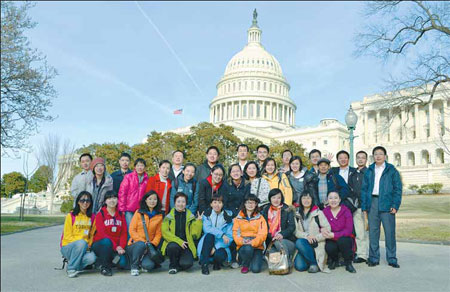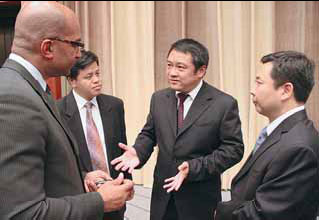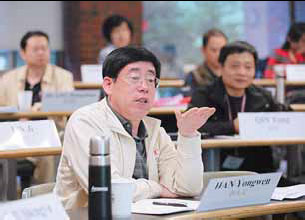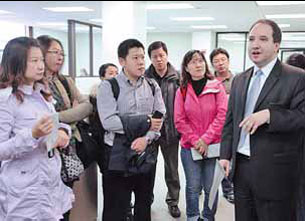Solving local problems with global expertise
Updated: 2012-11-13 08:08
By Wei Wei (China Daily)
|
||||||||
|
Government officials from Qingdao, Shandong province, studying at the University of Maryland on a visit to Capitol Hill. Photos Provided to China Daily |
|
Zhou Bin (center), head of the Shanghai Chamber of Commerce in Chicago, and Pang Jun (right) in discussion with a senior partner from Chicago Magazine during the 2011 training program. |
|
Senior officials study at the Harvard Kennedy School via short-term executive training or independent research. Martha Stewart / for China Daily |
|
Officials from Dalian in Liaoning province visit the Tax Division of Chicago's Department of Revenue as part of their one-year MPA program at the Illinois Institute of Technology. |
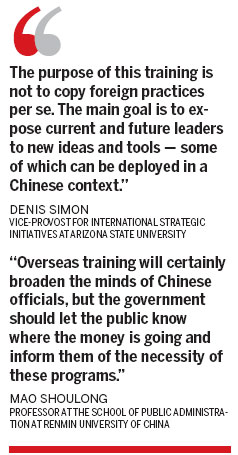
Overseas courses can make a world of difference in governance, reports Wei Wei in New York.
Having resumed work as a government official in the northeastern trading hub of Dalian four weeks ago, Pang Jun has been mulling over some changes inspired by his one-year Master of Public Administration course in Chicago.
During their time at the Illinois Institute of Technology, 40-year-old Pang and more than 20 other officials from Dalian studied courses on public policy, finance and communication, all taught in English, alongside students from around the world. They also had a chance to observe US life outside the classroom.
On a visit to Chicago's city council and the Illinois city of Naperville, Pang, who oversees Dalian's administrative permit service, was impressed by the speed at which things were done. In China, corporate or project registration can take months or even years, because applicants have to contact different government agencies at each step and wait 15 to 20 days to move on to the next, he said.
"But under the parallel system in US cities, people just hand in their application at one office, and then all the related agencies share and process the information simultaneously. The process is much quicker," said Pang, who plans to implement a similar system in Dalian in the coming year.
The 27 officials - most of whom hold master's degrees, but there were also seven with PhDs or PhD candidates - were chosen by a competitive selection procedure.
But in their first month in the US, the students struggled to understand "the fast lectures and cope with the piles of reading material", before finally engaging actively in class discussions. However, those initial problems didn't hamper the Chinese candidates, and they all graduated in September.
From open to global
Since Deng Xiaoping, the architect of China's reform and opening-up policy, called for "introducing wisdom from abroad" in the late 1970s, central and local authorities have been sending promising officials to Western countries and Singapore to study public administration, law and international relations.
About 257,000 people received training overseas from 2006 to 2010, said Ji Yunshi of the State Administration of Foreign Experts Affairs at a conference in 2011. During the same period, 41,000 took the Business Foreign Language Test organized by the administration, which has also certified 64 high-level overseas training institutions and 290 overseas training institutions.
Figures from the administration show that approximately 70,000 Chinese officials received on-the-job training overseas in 2010. Most enrolled in short-term programs, but some, like Pang, participated in a one-year degree course.
In addition to providing training for senior civil servants and young and middle-aged leaders, the administration also sent university administrators, senior executives and technicians of State-owned enterprises abroad to receive training.
Trainees are usually selected by the Party's organization department. To qualify for the same course as Pang, applicants must be younger than 50 and have at least three years work experience, a bachelor's degree and a score of at least 120 out of 200 in the English test overseen by the administration.
The high fliers, carefully vetted by the Central Organization Department, are sent to the Kennedy School of Government at Harvard University. The New World Fellows Program, established in 1998, has now tutored more than 550 Chinese participants from local and central governments and has expanded into a series of tailored and open-enrollment programs called the China Public Policy Program.
Many former students gained promotion on their return to China. They include the current Minister of Commerce Chen Deming, the governor of Shaanxi province Zhao Zhengyong, and Li Jiange, the chairman of China International Capital Corp.
Cases studies, such as Hurricane Katrina and the reform of property taxes in Indonesia, provided the students with a "tool kit" of public management. "So when they go home, they can choose the tool that's most appropriate to specific circumstances," said Julian Chang, executive director of the China Public Policy Program.
The academic curriculum is supplemented by visits to local, state and federal government organizations and tours intended to provide inspiration in solving public management issues. For instance, given rising concerns about China's rapidly aging population, the students were shown around apartments for the elderly in Boston.
They also visited Brigham and Women's Hospital, ranked eighth in the 2011 US News & World Report Honor Roll of America's Best Hospitals, and attended seminars on healthcare reform in Massachusetts. Others visited included the Boston Redevelopment Authority, a careers center in Boston and Bunker Hill Community College, one of the largest of its kind in the city.
Chang said the students learned from each other's experiences of working in different parts of China or the world. "In the customized programs, there's a lot of sharing of Chinese context. For example, someone from a big city may talk about his experiences, and those from the western regions with similar problems can learn from him. It's the same in the open-enrollment program. A lot of the learning takes place among the students. Their classmates may come from Russia, the Netherlands or France," he said.
Denis Simon, vice-provost for International Strategic Initiatives at Arizona State University, which has just finished training 30 officials from the Dalian Science and Technology Bureau, emphasized that Chinese civil servants need to "glocalize" themselves through overseas training.
"The purpose of this training is not to copy foreign practices per se. The main goal is to expose current and future leaders to new ideas and tools - some of which can be deployed in a Chinese context," said Simon
Fewer programs
The Chinese government forbids the use of training programs as an excuse for officials to travel overseas at the expense of the public. Organizers are charged with ensuring that study programs adhere strictly to the authorized schedule. If the rules are violated, the program's principal organizer is held responsible.
In recent years, the government has strengthened measures to monitor and evaluate overseas training programs. In Hubei province, for example, every participant is required to submit a report to the authorities within a week of the training program ending.
However, since 2008, a series of budget cuts has reduced the number of officials trained overseas. The cuts are part of official efforts to reduce the administrative cost of receptions, vehicles and overseas trips; areas that are considered a major source of corruption.
"Overseas training will certainly broaden the minds of Chinese officials, but the government should let the public know where the money is going and inform them of the necessity of these programs," said Mao Shoulong, professor at the School of Public Administration at Renmin University of China, who suggested that the local people's congresses should be involved in setting the budgets.
Questions have been raised as to why officials spent time traveling around the US, rather than staying in the classroom throughout the program, but that indicates a misconception about the training, according to Jeannette Dai-Wang, executive director of the Maryland China Initiative at the University of Maryland.
"In fact, the State Department requires that cultural trips should account for one-fourth to one-third of long-term training programs. Otherwise, people may not understand the context of American policies," she said.
When reviewing the students' resumes, Wang was struck by the fact that most local officials in China were educated and work in their home provinces. "It is necessary to broaden their horizons by studying abroad."
Shi Yonghao, an official from Yinchuan, capital of Ningxia Hui autonomous region, was among 27 officials that studied for the MPA program at the University of Illinois in Chicago.
Shi took more than 4,000 photos of "American public management 'cases'," including those relating to provisions for people with physical disabilities and also traffic-control measures. "People in interior areas like Ningxia seldom have the chance to gain this sort of experience overseas," said Shi.
Decline in numbers
Wu Wei, director of the Nanyang Center for Public Administration at Nanyang Technological University in Singapore, said misconduct by a few institutions should not result in a blanket ban on overseas training programs. The center has trained 13,000 civil servants during the past two decades and the faculty is composed of Singaporean officials, past and present.
"Systematic and professional overseas training is a strategic investment for the country's human capital, one that fosters mutual understanding of different countries," said Wu.
Wu also suggested the decline in the number of officials traveling abroad for training may be the result of a more prudent attitude by the supervising authorities, governments, and the universities.
The State Administration of Foreign Experts Affairs has also strengthened the selection and supervision procedures. According to the regulations, students should not travel to more than three cities in their country of study or to another country during short-term overseas training. The institutes that provide the training must be licensed by the administration and are not allowed to alter the curriculum once it's been agreed.
Local governments have been ordered to impose budgetary prudence. For instance, the Sichuan provincial government put its overseas training program out to open tender in 2011 and finally chose Nanyang Technology University from a range of bids from 52 universities, including Oxford, Peking and Tsinghua.
Wu said the universities are also responsible for providing quality training. In his school, every course has a final exam and students are required to retake if they fail first time around. Those with an absentee rate of more than 20 percent must retake the entire course.
Laura Ma, director of Harvard's China Public Program was impressed by the students' work rate. She noted that some students, all senior officials, have to walk for 15 minutes to attend breakfast in the school canteen at 7:15 am. After breakfast, they have an hour-long group discussion before sitting through three 90-minute classes. "Many don't get a chance to sleep before 10:30 pm, because they have to review piles of reading material for the next day's discussions," said Ma.
Train locally, think globally
China's Civil Service Law has made on-the-job training compulsory, mostly at Party schools and administration schools at various levels. And as the world becomes increasingly interconnected, the schools are emphasizing their global outlook.
A growing number of foreign leaders and heads of international organizations - including UN Secretary-General Ban Ki-moon, President of the European Council Herman Van Rompuy, German Chancellor Angela Merkel and Donald Rumsfeld, former United States secretary of defense - have visited the Central Party School, the most significant training institute for China's future leaders, and addressed the students.
Meanwhile, the National School of Administration, where middle-ranked and senior civil servants are trained, has been forging links and partnerships with counterparts overseas. The faculty includes 27 honorary professors from a number of countries, including the United Kingdom, the US, Canada, Germany and Japan.
"As globalization proceeds rapidly, China's leaders need to make sure they have professional-development roadmaps for officials to increase their global awareness and strengthen the range of choices and options available to them as they address policy issues and challenges in their daily work," said Simon.
Jiang Xueqing contributed to this story.
(China Daily 11/13/2012 page7)

 Relief reaches isolated village
Relief reaches isolated village
 Rainfall poses new threats to quake-hit region
Rainfall poses new threats to quake-hit region
 Funerals begin for Boston bombing victims
Funerals begin for Boston bombing victims
 Quake takeaway from China's Air Force
Quake takeaway from China's Air Force
 Obama celebrates young inventors at science fair
Obama celebrates young inventors at science fair
 Earth Day marked around the world
Earth Day marked around the world
 Volunteer team helping students find sense of normalcy
Volunteer team helping students find sense of normalcy
 Ethnic groups quick to join rescue efforts
Ethnic groups quick to join rescue efforts
Most Viewed
Editor's Picks

|

|

|

|

|

|
Today's Top News
Health new priority for quake zone
Xi meets US top military officer
Japan's boats driven out of Diaoyu
China mulls online shopping legislation
Bird flu death toll rises to 22
Putin appoints new ambassador to China
Japanese ships blocked from Diaoyu Islands
Inspired by Guan, more Chinese pick up golf
US Weekly

|

|
